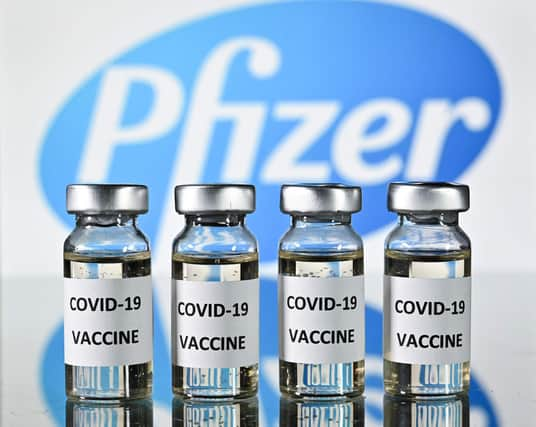Pfizer vaccine: Why are Pfizer and BioNTech seeking approval from FDA and EMA for a Covid booster vaccine?


With the Delta variant continuing to see cases spike again worldwide and in the UK, major pharmaceutical industry company Pfizer and partner BioNTech have announced that following successful initial trials of their booster dose, they will now seek approval for it as a third, booster vaccine from the FDA.
The companies say that while studies have shown the value of two Pfizer/BioNTech coronavirus jabs in creating immunity against Covid-19, they have been testing the third dose to see if it can deliver even greater immunity against the virus.
Advertisement
Hide AdAdvertisement
Hide AdThis comes in the wake of restrictions easing in the UK, with ‘Freedom Day’ awaiting England on July 19 next week and Scotland potentially moving into level zero on the same date.
As Pfizer is based in the US and BioNTech is based in Mainz, Germany, there is reason to believe that the companies will seek approval from multiple regulatory authorities – including the EU’s medicines regulator, the European Medicines Agency.
Here’s what you need to know about why the companies are trialling a third Pfizer/BioNTech vaccine as a booster dose.
Why are Pfizer and BioNTech seeking approval for a booster vaccine?
In a joint press statement issued on Thursday July 8, they said that plans for a third vaccine came as a result of “continued efforts to stay ahead of the virus causing COVID-19 and circulating mutations”.
Following results of initial studies suggesting that receiving a booster dose six months after being double-vaccinated could improve immunity against fast-spreading, tougher variants of covid-19 like the Delta Variant.
Pfizer and BioNTech explained recent data from the Israel Ministry of Health showed a decline in vaccine effectiveness in preventing both infection and symptomatic disease showed some decline six months after vaccination.
They said that based on the data received so far, there is some indicationthere might be need for a third dose to take place “within six to 12 months after full vaccination” and “may be beneficial to maintain the highest levels of protection”.
“While Pfizer and BioNTech believe a third dose of BNT162b2 has the potential to preserve the highest levels of protective efficacy against all currently known variants including Delta,” they added, “the companies are remaining vigilant and are developing an updated version of the Pfizer-BioNTech COVID-19 vaccine that targets the full spike protein of the Delta variant.”
What have regulators said in response?
Advertisement
Hide AdAdvertisement
Hide AdThe FDA and Center for Disease Control and Prevention in the US said in a joint statement issued last night (July 8) that "people who are fully vaccinated are protected from severe disease and death, including from the variants currently circulating in the country such as Delta", adding:
"We continue to review any new data as it becomes available and will keep the public informed.
"We are prepared for booster doses if and when the science demonstrates that they are needed.”
Pfizer secured a third contract with the EU to supply a further 1.8 billion doses of its covid-19 vaccination to the European Commission, with 900 million doses to be delivered from December 2021 and a further additional 900 million doses available to them on request.
The EU told Reuters on Friday July 9 that it was currently too early to say if a booster dose would be required, but has stated in vaccination guidance on its website that ‘at a certain point in time, we might need booster jabs to reinforce and prolong immunity.’
A message from the Editor:
Thank you for reading this article. We're more reliant on your support than ever as the shift in consumer habits brought about by coronavirus impacts our advertisers.
If you haven't already, please consider supporting our trusted, fact-checked journalism by taking out a digital subscription.
Comments
Want to join the conversation? Please or to comment on this article.